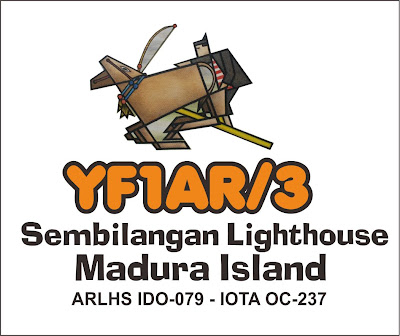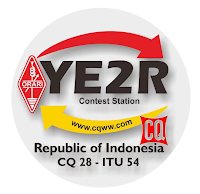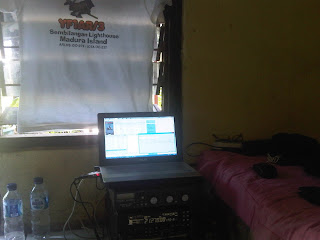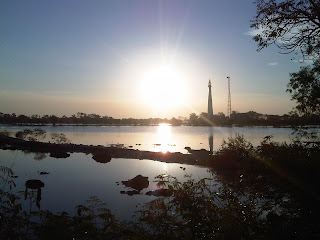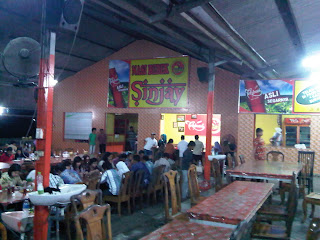Sembilangan (Ujung Slempit) (Range Rear) (2)1882. Active; focal plane 53 m (174 ft: two white flashes every 10 s. 50 m (164 ft) 12(?)-sided cast iron tower with lantern and gallery. Entire lighthouse painted white. Lawrence Eka’s photo is at right, Haryono Cokro has a 2008 photo, another photo is available, Fadli Mohammed has a photo, KITLV has a 1913 photo, the Tropenmusuem has a historic photo, and Google has a good satellite view. A portfolio of 2010 photos shows evidence of recent restoration work. Located on Semibilangan island off the extreme western tip of Madura, this is both a landfall light and the rear light of a range guiding ships into the channel between Madura and Java to approach the port of Surabaya. Accessible by road from Bangkalan, Madura. Site open, tower open although we do not know the schedule. ARLHS IDO-079; Admiralty K1158.2; NGA 23624.
Mercusuar Sembilangan or Sembilangan Lighthouse, is located in District Socah, 6 km from the center of Bangkalan capital. This tower has 78 meters high and was build by the Dutch and it inaugurated by Z.W. Williem III in 1879. At that time, this tower was use to guide the ships that went to Tanjung Perak harbor.
This tower has 17 floors building and the range of lights about 20 miles. While the total land area of this lighthouse is about 1 hektar. There are 3 navigators in this tower to maintain the tower, they live around the complex of the tower.
The function of the navigation lasts until 1999. Stepping in 2000, the lighthouse finally allowing the local people to get into the building of the lighthouse. This become the attraction of the citizens and become an alternative destination when we go to Madura island, especially to Bangkalan to enjoy the sceneries from the top of the lighthouse
Madura is a large island off the northeastern coast of Java. The island, roughly 130 km (80 mi) long east to west and up to 35 km (22 mi) wide, is separated from Java by the Madura Strait. At its western end, the strait is quite narrow and is crossed by the 5.4 km (3.4 mi) long Suramadu Bridge. On the south side of Madura, however, the strait is a broad sound up to 80 km (50 mi) wide. Madura has a population of roughly 4 million.
In 1624,
Sultan Agung of
Mataram conquered Madura and the island’s government was brought under the
Cakraningrats, a single princely line. The Cakrangingrat family opposed Central Javanese rule and often conquered large parts of Mataram.
Following the First Javanese War of Succession between
Amangkurat III and his uncle,
Pangeran Puger, the Dutch gained control of the eastern half of Madura in 1705. Dutch recognition of Puger was influenced by the lord of West Madura, Cakraningrat II who is thought to have supported Puger’s claims in the hope that a new war in central Java would provide the Madurese with a chance to interfere. However, while Amangkurat was arrested and exiled to Ceylon, Puger took the title of
Pakubuwono I and signed a treaty with the Dutch that granted them East Madura.
The Cakraningrats agreed to help the Dutch quash the 1740 rebellion in Central Java after the Chinese massacre in 1740. In a 1743 treaty with the Dutch, Pakubuwono I ceded full sovereignty of Madura to the Dutch, which was contested by
Cakraningrat IV. Cakraningrat fled to
Banjarmasin, took refuge with the English, was robbed and betrayed by the sultan, and captured by the Dutch and exiled to the
Cape of Good Hope.
The Dutch continued Madura’s administrative divisions of four states each with their own regent. The island was initially important as a source of colonial troops and in the second half of the nineteenth century it became the main source of salt for Dutch-controlled territories in the archipelago
Explore Madura, in Indonesia, famous for its Bull racing, music and culture.
Madura is an Indonesian island off the northeastern coast of Java. The island comprises an area of approximately 4,250 km. Madura is administered as part of the East Java province. It is separated from Java by the narrow Strait of Madura.
Madura is famous for is bull-racing competitions, where a jockey, usually a young boy, rides a simple wooden sled pulled by a pair of bulls over a course of about 100 meters in ten to fifteen seconds. Several towns on the island hold races in August and September of each year, with a large final for the Presidential Trophy held in Pamekasan in late September or October.
Music and theater
Several forms of music and theater are popular on Madura, particularly among poorer people for whom they provide an inexpensive form of entertainment and community-building. The topengtheater, which involves masked performances of classical stories such as the Ramayana and Mahabharata, is the Madurese performance art best known outside the island, due to its role as a representative Madurese art form at exhibitions of regional cultures from all over Indonesia. However, performances of it are rare on Madura, and are generally restricted to entertainment at large official functions. The less formalloddrok theater, where performers do not wear masks and perform a wider range of themes, is more popular on the island.

The gamelan orchestra, best known as a classical Javanese instrument, is also played on Madura, where several of the former royal courts, such as at Bangkalan and Sumenep, possess elaborate gamelans. Tongtong music, more exclusive to Madura, is played on several wooden or bamboo drums, and often accompanies bull-racing competitions
.
Equipment
Radio Yaesu FT 450 with tuner FC 707 power 100W
Antenna 3 el Yagi 15m band and GroundPlane fullsize 40m band for 10m – 40m band
Mode mainly on Phone and spare time on CW n Digital
QSL Info
QSM via N2OO Bob Schenck
www.qrz.com/db/yf1ar
http://www.qsl.net/n2oo/history/qsl-n2oo.htm
Donation


![]()

 YB Land DX Club DX-ing Is Our Life
YB Land DX Club DX-ing Is Our Life

